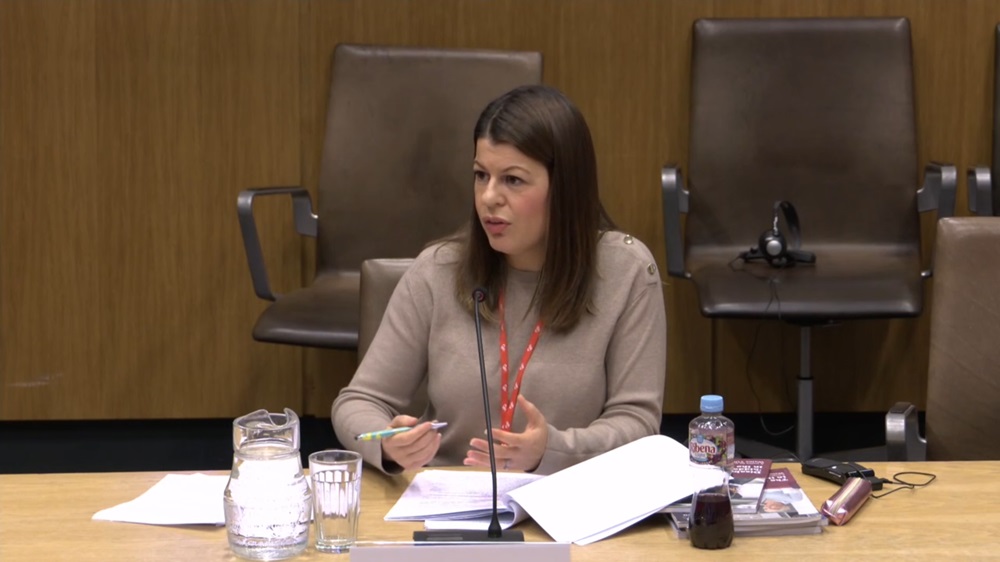Disabled women face ‘discrimination double whammy’ at work

Chris Haines, ICNN Senedd reporter
Disabled people are more than £2,100 a year worse off than non-disabled colleagues, with women facing a double whammy of discrimination at work, a Senedd committee heard.
Rhianydd Williams, of the Trades Union Congress (TUC) Cymru, gave evidence to the equality committee as part of an inquiry on disability and employment.
Ms Williams told the committee that the umbrella body estimates the pay gap at £1.16 an hour or, based on a 35-hour working week, £2,111.20 a year.
Ms Williams said the difference is wider for women as she called for mandatory reporting of disability pay gap information and a greater focus on intersectionality.
She highlighted disability pay gap day on November 7, the day an average disabled worker effectively stops being paid for the rest of the year compared with a non-disabled colleague.
‘Discrimination’
Jenny Rathbone, who chairs the equality committee, warned that disabled women face a “double whammy of discrimination” in the workplace.
Ms Williams, TUC Cymru’s equality and policy officer, said accessing reasonable adjustments under the Equality Act 2010 remains a major barrier.
She called for time limits as well as a passporting system to keep a live record of adjustments agreed between workers and employers.
Ms Williams said employers often have the final say on what is deemed reasonable and some do not budget for any adjustments.
She warned: “A lot of the time people will just leave the workplace: they’ll experience discrimination and they will leave.”
‘Unacceptable’
Ms Williams pointed to examples of branches submitting grievances to try to make sure basic facilities such as workplace toilets are available.
Asked about the Welsh Government’s disability rights taskforce, she said the pace of progress has been slow and she had hoped an action plan would be in place by now.
Dee Montague-Coast, engagement officer at the Fair Treatment for the Women of Wales charity, told the committee she often works in her pyjamas from her adjustable bed.
“In my previous workplaces, things like that would have been seen as totally unacceptable or ‘not quite right’,” she said. “So, I think as a wider society, we have a lot to do in terms of making experiences like mine just normalised.”
She called for a one-stop shop for support and a no-wrong-door approach, warning disabled people face a significant administrative burden in navigating various systems.
‘Despair’
Ms Montague-Coast, who had a decades-long delay in getting a diagnosis for endometriosis, said people have been treated appallingly by the UK Government over the past 15 years.
She said: “I think there’s despair from disabled people, from disabled people’s organisations, … that they are still being left out of conversations … and decisions made about us.”
Ms Montague-Coast criticised the new Labour UK Government’s decision to continue reforms aimed at tightening work capability assessments.
She said: “We need to recognise that there are disabled people who cannot work and should not be expected to try to find work. But they’re going to be up to £5,000 worse off.”
Ms Montague-Coast added that society tends to view disability as inspirational or tragic, with little in between, warning that ‘hidden’ disabilities do not fit that narrow narrative.
‘Weeded out’
Angharad Dean said she found employers were more accommodating of working from home during the pandemic but flexibility retreated as the world started opening up.
Ms Dean, a new mother who is registered blind and uses a guide dog, told the committee she has been searching for work but not getting anywhere.
She warned disabled people continue to be “weeded out” of application processes, leaving people too scared to disclose conditions.
She told the committee it took six months to receive support under Access to Work, a UK scheme that provides grants, in her previous job.
She told the meeting on November 11: “I was out of pocket for such a long time that my pay cheque wasn’t actually giving me any money at the end of the month.”
Support our Nation today
For the price of a cup of coffee a month you can help us create an independent, not-for-profit, national news service for the people of Wales, by the people of Wales.




